- Home
- Nichole Christoff
The Kill Chain Page 15
The Kill Chain Read online
Page 15
“Well,” Stephen said, “this must be for you.”
He extracted a key fob from his bomber jacket’s pocket, laid it in my palm, and steered me toward a nut-brown GMC Denali parked in the mouth of a nearby hangar.
“Thanks,” I told him. “For everything.”
And on second thought, I added, “You know, it might be wise if you forget you ever met me.”
“So the FBI won’t grill me?” Stephen brayed with laughter. “You should see the look on your face right now, Ms. Sinclair.”
“But I—”
“You don’t have to worry about a thing. We all signed a confidentiality agreement when we went to work for Niilo and you’re not the most controversial cargo we’ve carried. Besides, we know what’s what. Most of us guys? Well, we’re planning to vote for your old man.”
Stephen’s sentiment left me speechless. He chuckled as he headed back to work. And once he’d gone, I didn’t waste time hitting the road.
The Denali had a full tank of gas, but I pulled into the first service station I saw. There, I risked being identified as I bought a burner phone, complete with a maps app and a Web browser. Keeping my ball cap pulled low, I paid for the burner with cash from the stash in the backpack—and when the activation wizard asked for a name and address, I used Madeline’s.
Enid had said the authorities would be able to locate me the moment I fired up the new phone Niilo had provided. That was a stone-cold fact. I, however, needed a little more data to locate Kenneth Jones.
The burner gave it to me.
Forty-four minutes later, I’d set up shop in the parking lot of Fair Skies, an apartment complex in Fairfax County. I’d found this address on a résumé Kenneth Jones had uploaded to a job listings website just Saturday. Perhaps not too coincidentally, that was the day Nathan Rappaport and Jones’s superior, the news director, had begun to ask him some tough questions.
With this being Sunday, I didn’t expect Jones to be at work at the TV station. The closed and darkened blinds covering his windows suggested he wasn’t home, either. That, though, was all right with me.
I’d make myself comfy and wait for his return.
The Fair Skies’ parking lot was as bright as a baseball diamond at night. So were the open-tread stairwells that punctuated each apartment block now and again. But down one of the wide, white aluminum-sided breezeways, where Jones had a first-floor apartment, the residents’ choice to flick off the decorative barn lights above their steel-core doors made the place a burglar’s dream.
Jones’s plain black door featured a deadbolt mounted above a brushed-aluminum knob with a simple spring lock in its center. The knob showed signs of having been installed in a hurry, probably by a busy maintenance man rather than by a trained locksmith. For one thing, it sat slightly off in the door’s factory-bored hole that had been meant to hold it. And for another, the rose—or circular trim that’s usually snugged against the door—spun loosely at the stem of the knob itself.
With that kind of slapdash security, Jones could be glad I got to work at taking the knob assembly apart instead of waiting around for a thief to do it for me. It took no effort and little time to slip on my gloves and apply the small flat-head screwdriver I’d brought with me to the rose. Sliding it aside left the mechanism behind it, and tucked into the bore hole, vulnerable—so my miniature flat-head screwdriver made quick work of that, too.
Once I had access to the tumbler within the door, I forced it from the latch assembly and gave it a good push. Instantly, I was rewarded with the thunk of it and the interior knob falling onto Jones’s floor indoors. From that point, I’d planned to rig some wire, feed it through the hole in the door, and fiddle until I flipped the deadbolt’s thumb latch just above. But when I leaned against the door to test the bolt’s fit, the door shifted easily in the jamb. Because Kenneth Jones, as it turned out, hadn’t engaged his deadbolt at all. And once I retracted the spring lock’s latch mechanism by sliding it exactly as I’d slid the tumbler, I was home free—and free to enter Jones’s home.
Leaving the door ajar, I gave the place a quick once-over, just to be sure I was indeed alone. Jones didn’t share his apartment with a cat or a dog, and from the look of the single bedroom, illuminated by the parking lot’s lamplight slanting through the blinds, he didn’t have a roommate, either. Now I could work at my leisure.
I reassembled the spring lock and screwed the doorknobs into position. Jones, whenever he arrived, would never know the difference. And his place would end up being more secure after I departed.
But I wasn’t going to leave quite yet, though the strong smell of last week’s spoiled take-out tempted me to carry out his garbage. A tall, thirteen-gallon trash can sat right next to the door. Lily-white floor tiles and a breakfast bar marked it as the boundary to the tiny kitchen.
The end of the bar had become a dumping ground for anything Jones had in his hands when he came home. A tattered canvas messenger bag, a smeary stainless-steel travel mug, and junk mail, mixed with the requisite bills, lay disregarded on the countertop. I flipped through envelopes and sales fliers, tipping them to catch the light streaming through the living room blinds. I found nothing worth writing home about. And all the while, my fingers ached to rummage through Jones’s bag.
Much to my chagrin, Jones hadn’t been hauling around a laptop. I couldn’t fire it up, attempt to search his email, and instantly uncover delicious details about the person who’d pegged me as Fraley’s supposed murderer. I did, however, find the power cord for a computer—and that gave me hope I’d find one in the apartment yet.
The bag’s pockets produced nothing more interesting than breath mints and a Washington Metro SmarTrip fare card. Creased and crumpled receipts for the Park-and-Ride and low-cost cups of gas station coffee had been abandoned in its depths. Fistfuls of cheap ballpoint pens stamped with the TV station’s call sign lay forgotten in the bottom.
Frustrated, I turned to the living room. Sparsely furnished, it had all a bachelor needed. A comfortable-looking broken-down sofa anchored one wall, while a sagging recliner had been aimed directly at the wall-mounted TV. Beneath the TV, a coffee table, salvaged from his parents’ place no doubt, held a tangle of cords for both a PlayStation and an Xbox One. No laptop computer had been stashed between the gaming systems, though, and I felt for it in every nook and cranny of the furniture.
In the bathroom, I dared to flip on the overhead light since this room wasn’t in danger of being seen from the street. Immediately, I wished I hadn’t. Soap scum and discarded underwear abounded.
In the bedroom, a second TV had been equipped with a streaming stick. But those were the only electronics I found. So I dug a little bit deeper.
The walk-in closet held clothes, muddy cleats and a baseball glove, and shoe boxes with contents as advertised. The cabinet beneath the bathroom sink was bare except for a plunger and toilet bowl cleaner Jones had apparently never used. But in the kitchen, I hit pay dirt.
It just wasn’t in the form that I’d expected.
Chapter 24
When Kenneth Jones’s kitchen cabinets turned up nothing remotely similar to his tantalizing laptop, I had to ask why.
Answer One dictated he’d taken the computer with him. Answer Two suggested he’d left it at work, in his car, or maybe even dropped it off at a shop for repairs. Answer Three, however, intimated that he’d hidden the thing extremely well—because something on it was extremely damning.
As a security specialist, I was well aware that folks often weren’t half as clever as they thought they were when it came to hiding things, so I peeked into a very stupid hiding place: Jones’s unused oven, which only held two racks and the owner’s manual, still wrapped in plastic. I checked the interior of his splattered microwave, too. It smelled of hot dogs and SpaghettiOs. But the contents of his refrigerator lit me up like a Roman candle.
The ic
ebox proved to be a haven for craft beer, a moldy mustard bottle, and sour pickles in cloudy brine. Perched on the center shelf, however, stood a white doggie bag. Like a gift bag with twisted paper handles, it bore the scrolling logo of a red dragon coiling around a plate.
That logo was the symbol for one of DC’s most expensive eateries, the Saint George.
The Saint George was a high-priced steak house parked partway between the Capitol, the Eisenhower Executive Office Building, and the New Executive Office Building, where a myriad of government employees—elected, appointed, and just plain hired—worked to keep the nation firing on all cylinders. Senators, staffers, congressmen, and more mixed and mingled at its well-stocked bar and even its private dining rooms upstairs. The charge for a measly cold appetizer prepared in its kitchen could take a bite out of a rich man’s wallet—which led me to believe that Kenneth Jones hadn’t dined there on his own dime.
The fact that the bag’s hand-rubbed rib eye, wrapped in a tinfoil dragon, was still fresh convinced me that Jones may’ve met there with his so-called anonymous source. I found no receipt in the bag, nothing to indicate who’d paid, and even less to signify who’d had a seat at the table. Still, this supposition was more than I’d had when I arrived.
I just needed to prove it.
And while the bright light of Jones’s icebox still cut a swath through the kitchen and up and over me, the man himself arrived home.
The sound of his key in the lock steeled me. I shut the fridge, darted to his recliner, and lounged on its arm like I owned it.
Jones entered, but he wasn’t alone. He had his hand on the rear of a short but buxom brunette. Drawing her into the apartment with him, he tossed his keys amid the junk mail on the countertop. In the relative dark, the two took a moment for a wet, sloppy kiss. When the woman came up for air, Jones hit the light switch.
“Make yourself at home,” he told his guest. “I’ll get you a drink.”
“Do you have any cabernet?” She giggled.
“I’ll check.”
Good luck with that, I thought. With nothing but beer on hand, he’d have to turn water into wine. And I’d begun to believe Kenneth Jones wasn’t a man who could pull that off.
Without so much as a glance in my direction, Jones rounded the peninsula. He stuck his head in the refrigerator. From this angle, he looked like your perfectly average twenty-something teetering on the edge of thirty. Average height, average weight. All that beer and eating out had yet to catch up with him. But it would.
Jones’s shoe-brown hair had begun to thin at the crown. His tan chinos had grown a little tight in the waist. And his skin had taken on the sallow cast of someone who spent too much time in front of a screen.
His companion was headed in the same direction, health-wise. Maybe she knew it, and maybe that’s why she chose that moment to enhance her natural looks by digging into her tiny handbag for her lip gloss. She didn’t have a mirror to help her apply it, however, and when she looked around for a reflective surface, she ended up seeing me.
“Hiya,” I said.
The brunette’s eyes blinked wide. “Kenny, who is this?”
Now he was staring at me, too.
“Who are you? What do you want? How did you get in here?”
“Who, what, where, when, why, and how,” I replied. “You nearly got ’em all. No wonder you’re a news producer.”
The mention of his occupation got Jones’s gears going. He recognized me. He’d put my face on television.
“I’m calling the cops,” the brunette shrilled. She yanked her smartphone from her jacket pocket.
“Go ahead,” I said.
“No, wait,” Jones intervened.
Because in that moment, he knew what I knew: that he’d have to explain what the fugitive named in his news broadcast was doing lounging on the arm of his recliner. And while the police might accept some cock-and-bull story about a break-in and haul me away, his news director would hear about the incident sooner rather than later. The man would have questions, Jones wouldn’t want to give answers, and he’d end up not only unemployed but with a reputation for sweeping the details under the rug in an industry where accuracy and truthfulness set you apart.
“Trina,” Jones said, “I think you should go home.”
He hadn’t moved from the fridge.
I hadn’t moved from the recliner’s arm.
“Why?” Trina demanded. “What’s going on here? Is she your wife? Kenny, you told me you were single!”
“Oh, he’s single,” I said.
Faster than I thought possible, Jones blew across the room. I shot to my feet in case he came at me. But he only shoved Trina out the door.
“I’ll text you later, baby. Promise.”
He shut the door in her face.
And this time, he remembered to turn the deadbolt.
When he rounded on me, he had blood in his eye.
“I don’t know how you got in here,” he said, “but you’d better leave. Immediately.”
“Or what?” I asked. “You’ll have to call your anonymous tipster and tell him I turned up in your favorite chair?”
Jones’s puffy face flushed.
I said, “This upholstery’s very soft, by the way. What’s the fiber content?”
“You’re a wanted criminal.”
“And I want to see your email.”
“My—”
“Of course, email leaves a trail. So I’m betting your informant called you at work. But you’ve got something incriminating on your laptop, don’t you? That’s why it’s not here.”
“A news producer’s sources are confidential—”
“And yours is pretty well-off, too, considering he or she is willing to buy you a meal at the Saint George.”
Jones swallowed so hard his Adam’s apple bobbed in the open neck of his yellow oxford shirt.
I took advantage of his discomfiture, pulled the burner phone from my pocket, and snapped his photo with it.
I said, “I’ll be seeing you around, Kenny. That means your informant just might see me, too.”
I strode past him, flipped the deadbolt, and yanked his front door open.
He caught my upper arm in a grasp painful enough to leave marks. “Somebody’ll stop you.”
“Maybe,” I admitted. “But it won’t be you. And it won’t be whoever persuaded you to run a fabricated story about me.”
I stared him down until he released me. It didn’t take long. But I knew I’d have bruises that would last a week.
Escaping Jones’s apartment, I bolted along the breezeway, cut through the complex’s parking lot, and avoided hot spots thrown down by the security lights. I wasn’t too worried about possible security cameras, however. My ball cap would shield my face from most of those.
Besides, Kenneth Jones would have to register a complaint with the police for any video to become an issue.
And after the scare I’d just put into him, I was fairly certain he’d do no such thing.
In the heavy dark mitigated by the city’s dome of light pollution, I circled Fair Skies. Behind the trio of apartment buildings that made up the complex, a knoll separated the settlement from a rushing state route, thick with chain restaurants, fast-food joints, and dry cleaners’ shopfronts. On the top of this knoll, a row of larches had been planted to blot out the sight and the sound of the congested thoroughfare. The trees did a decent job of accomplishing this task—and, positioned as they were, I figured they’d do a good job of screening me as well while I monitored the breezeway that sheltered Jones’s front door.
They did.
And barely ten minutes after I’d warned Jones that he couldn’t get in my way, he barreled from his apartment without paying me or anyone no never mind. In the parking lot, he popped the trunk of an aging white Jetta. He rummage
d noisily around in the compartment.
Content with whatever he saw in there, he slammed the lid, hustled to the driver’s side, climbed into the car, and took off. I sprinted for my Denali. And when Jones braked for a stoplight two blocks down, I was three car-lengths behind him.
I followed Jones at a distance, allowing cars, trucks, and SUVs to slide between us now and again. He wasn’t in a hurry. Instead, he drove with the flow of traffic, and that led me to believe he had no inkling he’d picked up a tail.
Four miles down the main drag, he turned westward. And when the on-ramp to Interstate 66 appeared, he drove up and onto the westbound lanes. Thirty-two minutes later, he exited at a state route that wound deep into the Virginia countryside a mere a stone’s throw from the Blue Ridge Mountains.
Tiny towns popped up along the route, one after the other. More than bedroom communities for the nation’s capital, these towns were steeped in their own rich histories. Triple-story brick taverns that had once offered shelter to colonial traders still stood along the main streets. Marble obelisks memorialized their war dead, killed in action in the American Revolution and much more recently in Iraq and Afghanistan. But life had continued in these towns as well. Modern hospitals, cellphone towers, and elementary schools with students’ hand-drawn tulips pasted to the windowpanes testified as much.
In one particular town, Jones turned from the state route where a bank and the sheriff’s department sat on opposite corners. He cruised past a real estate office and a barber shop. And at the next street, he turned again, only to hook suddenly into an alley and a desolate parking lot.
I slowed to a halt in front of a US Postal Service drop box. Without big-city traffic to cloak my moves, I had to be careful now. If Jones sighted me, he could flee from me—or worse.
He could confront me.
The parking lot backed a pretty brick building. White letters on a green sign spelled out Public Library Parking Only. However, I didn’t believe Jones had driven all this way to return some borrowed books.

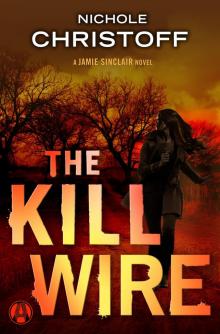 The Kill Wire
The Kill Wire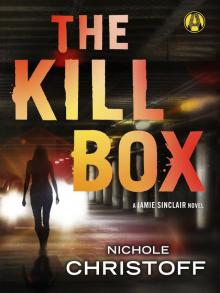 The Kill Box
The Kill Box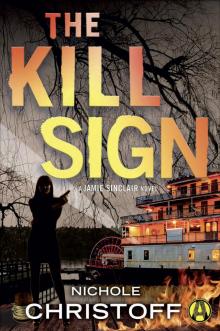 The Kill Radius
The Kill Radius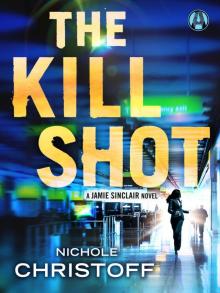 The Kill Shot
The Kill Shot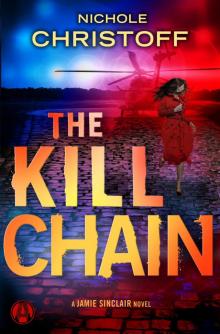 The Kill Chain
The Kill Chain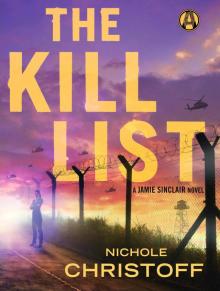 The Kill List
The Kill List